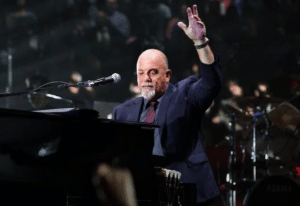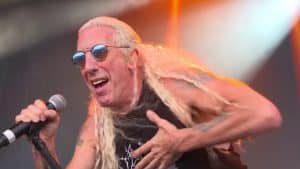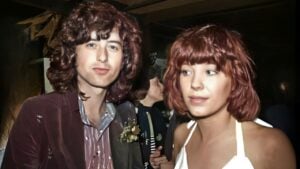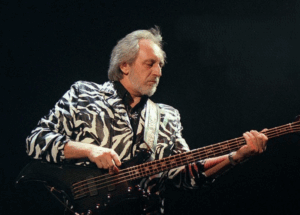10 Rockstars Who Turned Their Backs on Fame

via Live Magic / YouTube
Not everyone is cut out for the pressures of stardom. In the music industry, fame often comes hand in hand with relentless scrutiny and constant attention. Some musicians, despite achieving great success, have chosen to step away from the spotlight and live a more ordinary life. Let’s take a look at several talented individuals who made that decision:
John Frusciante
View this post on Instagram
John Frusciante is widely recognized as the talented lead guitarist of the Red Hot Chili Peppers, known for his exceptional musicianship and creative contributions to the band’s sound. Throughout his career, Frusciante has prioritized his passion for music over the trappings of celebrity status.
Following the massive success of the Red Hot Chili Peppers’ album “Blood Sugar Sex Magik” in 1991, Frusciante grappled with the pressures of fame and ultimately made the decision to leave the band. During his hiatus from the spotlight, he embarked on a tumultuous journey marked by struggles with depression and addiction to heroin.
Despite his personal challenges, Frusciante continued to pursue his artistic interests, delving into writing screenplays and short stories during this period of introspection. Eventually, he sought help through rehabilitation and embarked on a path of recovery.
In a surprising turn of events, Frusciante reunited with the Red Hot Chili Peppers, bringing his distinctive guitar style back to the band’s lineup. However, his time with the group has been characterized by periods of departure and return, as he has occasionally stepped away to explore his solo ventures.
John Deacon
View this post on Instagram
John Deacon, often overshadowed by the flamboyant persona of Freddie Mercury, played a vital role as the bassist and financial manager of Queen. Not only did he contribute to the band’s distinctive sound with his bass lines, but he also showcased his songwriting prowess by penning hits like “Another One Bites the Dust,” “You’re My Best Friend,” and “I Want to Break Free.”
Tragically, Deacon was deeply affected by the loss of Freddie Mercury, which led to a significant shift in his involvement with Queen. Overwhelmed by grief, he gradually lost interest in continuing to perform with the band and ultimately made the decision to retire from the spotlight.
Since his retirement, Deacon has maintained a low profile, choosing to stay out of the public eye. Despite his absence from the limelight, he remains involved in overseeing the band’s financial affairs, ensuring the legacy of Queen is preserved.
Cat Stevens
View this post on Instagram
Cat Stevens, celebrated as one of the foremost folk artists in music history, earned his place in the Rock and Roll Hall of Fame in 2014, a testament to his enduring influence. During the early 1970s, Stevens reached the pinnacle of his career with the release of acclaimed albums such as “Tea for the Tillerman” and “Teaser and the Firecat.” These albums boasted iconic tracks like “Peace Train” and “Father and Son,” which resonated deeply with audiences worldwide.
However, Stevens’s journey took a profound turn in the late ’70s as he embarked on a spiritual quest that ultimately led to a significant life change. Influenced by his exploration of various world religions, Stevens underwent a transformation and embraced Islam in 1977, adopting the name Yusuf Islam.
Following his conversion, Yusuf dedicated himself to philanthropy, utilizing his considerable royalty earnings for charitable endeavors. Notably, he established the Islamia Primary School in London and founded several charitable organizations aimed at promoting humanitarian causes.
Grace Slick
View this post on Instagram
Grace Slick emerged as one of the most influential figures from the vibrant San Francisco psychedelic scene, leaving an indelible mark on music history through her captivating performances with Jefferson Airplane and Jefferson Starship. Renowned for her mesmerizing and soulful vocals, Slick’s contributions became synonymous with the psychedelic sound of the 1960s.
Despite her enduring impact, Slick made a decisive exit from the music industry following a brief Jefferson Airplane reunion in 1989. Her departure stemmed from a personal conviction that transcended mere musical considerations. Slick famously expressed her belief that rock and roll, with its rebellious and youthful essence, was best suited for the younger generation. In her view, continuing to perform beyond the age of 50 appeared incongruous and out of touch with the spirit of the genre.
Embracing this philosophy, Slick gracefully stepped away from the public eye, choosing to redirect her creative energies towards other artistic pursuits. Immersing herself in the realms of painting, drawing, and literary endeavors, she found fulfillment in exploring new avenues of self-expression. Additionally, Slick embarked on the introspective journey of penning her autobiography, offering readers a glimpse into her remarkable life and career.
Syd Barrett
View this post on Instagram
Syd Barrett initially rose to prominence as the creative force behind Pink Floyd, contributing his talents as a vocalist, lead guitarist, and primary songwriter to their debut album, “The Piper at the Gates of Dawn.” His innovative playing style and lyrical prowess propelled the album to critical acclaim, reaching impressive heights on the charts. However, Barrett’s journey was fraught with personal struggles that would ultimately redefine his legacy.
Amidst his musical success, Barrett grappled with profound mental health challenges, exacerbated by his experimentation with LSD and potentially compounded by schizophrenia. His erratic behavior and increasingly unpredictable demeanor became cause for concern among his bandmates, who witnessed a stark departure from the vibrant artist they once knew. In 1968, Barrett parted ways with Pink Floyd, marking the end of an era for the iconic group.
Captain Beefheart
View this post on Instagram
Captain Beefheart, renowned for his unconventional approach to music, left an indelible mark on the avant-garde music landscape with his distinctive sound. Over the span of nearly two decades, from 1964 to 1982, he produced a remarkable catalog of thirteen albums, blending elements of avant-garde free jazz and rock into a singular, enigmatic style. Despite the esoteric nature of his music and its limited commercial appeal, Captain Beefheart’s influence reverberated widely within the experimental rock community, earning him a revered status among fellow musicians and enthusiasts alike.
Following the release of his final album, “Ice Cream for Crow,” in 1982, Captain Beefheart made the decision to step away from the music industry, opting instead for a life of seclusion and artistic exploration. Embracing his passion for painting, he redirected his creative energies towards the realm of visual art, where his talents flourished in new and unexpected ways. Departing from the constraints of musical convention, Beefheart’s abstract expressionist paintings captivated audiences with their bold compositions and vibrant colors, earning acclaim from art critics and enthusiasts alike.
Neil Peart
View this post on Instagram
Neil Peart, renowned for his unparalleled drumming prowess, carved out a legendary career in the realm of progressive rock alongside his bandmates in Rush. Despite the band’s meteoric rise to superstardom, Peart remained steadfast in his commitment to his craft, eschewing the trappings of fame and fortune in favor of a more introspective and private existence.
Throughout Rush’s illustrious career, Peart’s reserved demeanor and inherent shyness often set him apart from the spotlight, with the drummer preferring to let his music speak volumes rather than seeking adulation from fans and media alike. His reluctance to engage with the public eye became a defining characteristic of his persona, with Peart making a swift exit from the limelight following each electrifying performance, eschewing the fanfare and adulation that often accompanied his status as a musical icon.
Despite his reticence in the public sphere, Peart’s innermost thoughts and emotions found expression through his evocative songwriting, offering listeners a glimpse into the complexities of fame and personal identity. In tracks like “Limelight,” Peart candidly explored the paradox of celebrity, grappling with the dichotomy between public adulation and private introspection. For Peart, the pursuit of excellence in his craft transcended the allure of fame, with the drummer valuing artistic integrity and personal fulfillment above all else.
Kurt Cobain
View this post on Instagram
Kurt Cobain, the enigmatic frontman of Nirvana, grappled with the complexities of fame throughout his career. Despite his immense impact on the music industry, Cobain struggled with the pressures of celebrity and often felt isolated in the spotlight. Known for his rebellious spirit, he challenged traditional norms, even donning a dress onstage to defy expectations.
However, the weight of fame and his ongoing battle with depression took its toll on Cobain, culminating in his tragic decision to end his own life during the In Utero tour. His untimely death left a void in the music world, leaving fans to ponder the music he might have created had he survived. Cobain’s legacy continues to resonate, a testament to his enduring influence on rock music and his ongoing struggle with fame and personal demons.
George Harrison
View this post on Instagram
George Harrison, famously known as ‘The Quiet Beatle,’ faced the daunting challenge of maintaining privacy after The Beatles skyrocketed to fame. Despite his success with the iconic band and as a solo artist, Harrison preferred a more low-key approach to his music career.
Following The Beatles’ breakup, Harrison’s solo endeavors, notably his album “All Things Must Pass,” reflected his fascination with Eastern philosophy and spiritual pursuits. He approached his solo career with a sense of detachment from the trappings of fame, often making music out of personal fulfillment rather than seeking public acclaim.
Even during his resurgence in the late 1980s, Harrison remained focused on making music with close friends rather than pursuing widespread recognition or accolades. Unlike some of his bandmates, he shied away from extensive press tours and public appearances, preferring a quieter existence away from the spotlight.
Despite his immense success with The Beatles, Harrison valued his privacy and cherished the camaraderie of close friendships over the trappings of fame. His legacy as a revered musician and spiritual seeker continues to inspire fans around the world.
Bob Dylan
View this post on Instagram
Bob Dylan, a legendary figure in the music industry, has mystified audiences for over five decades with his enigmatic persona and groundbreaking music. Throughout his career, Dylan has defied the conventions of the traditional rock star archetype, continually reinventing himself and challenging societal norms.
From his early days as the voice of his generation, Dylan garnered attention for his thought-provoking lyrics and unconventional approach to music. He often used his platform to critique the very industry that propelled him to fame, pushing boundaries with songs like “Ballad of a Thin Man” and controversially embracing electric instrumentation.
Following a motorcycle accident in the late 1960s, Dylan retreated from the public eye, delving into darker themes and introspective songwriting. Albums like “Blood on the Tracks” offered glimpses into Dylan’s private thoughts, yet maintained an aura of mystery and intrigue. Despite experiencing periods of both critical acclaim and commercial success, Dylan’s subsequent albums continued to defy expectations and confound audiences. His reluctance to conform to societal norms and his inscrutable persona have only added to his allure as one of music’s most enigmatic figures.



















